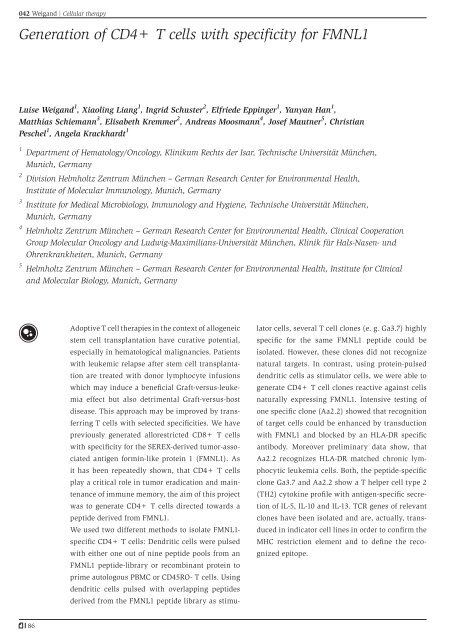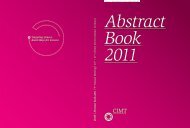Abstract Book 2010 - CIMT Annual Meeting
Abstract Book 2010 - CIMT Annual Meeting
Abstract Book 2010 - CIMT Annual Meeting
You also want an ePaper? Increase the reach of your titles
YUMPU automatically turns print PDFs into web optimized ePapers that Google loves.
042 Weigand | Cellular therapy<br />
Generation of CD4+ T cells with specificity for FMNL1<br />
Luise Weigand 1 , Xiaoling Liang 1 , Ingrid Schuster 2 , Elfriede Eppinger 1 , Yanyan Han 1 ,<br />
Matthias Schiemann 3 , Elisabeth Kremmer 2 , Andreas Moosmann 4 , Josef Mautner 5 , Christian<br />
Peschel 1 , Angela Krackhardt 1<br />
1<br />
Department of Hematology/Oncology, Klinikum Rechts der Isar, Technische Universität München,<br />
Munich, Germany<br />
2<br />
Division Helmholtz Zentrum München – German Research Center for Environmental Health,<br />
Institute of Molecular Immunology, Munich, Germany<br />
3<br />
Institute for Medical Microbiology, Immunology and Hygiene, Technische Universität München,<br />
Munich, Germany<br />
4<br />
Helmholtz Zentrum München – German Research Center for Environmental Health, Clinical Cooperation<br />
Group Molecular Oncology and Ludwig-Maximilians-Universität München, Klinik für Hals-Nasen- und<br />
Ohrenkrankheiten, Munich, Germany<br />
5<br />
Helmholtz Zentrum München – German Research Center for Environmental Health, Institute for Clinical<br />
and Molecular Biology, Munich, Germany<br />
86<br />
Adoptive T cell therapies in the context of allogeneic<br />
stem cell transplantation have curative potential,<br />
especially in hematological malignancies. Patients<br />
with leukemic relapse after stem cell transplantation<br />
are treated with donor lymphocyte infusions<br />
which may induce a beneficial Graft-versus-leukemia<br />
effect but also detrimental Graft-versus-host<br />
disease. This approach may be improved by transferring<br />
T cells with selected specificities. We have<br />
previously generated allorestricted CD8+ T cells<br />
with specificity for the SEREX-derived tumor-associated<br />
antigen formin-like protein 1 (FMNL1). As<br />
it has been repeatedly shown, that CD4+ T cells<br />
play a critical role in tumor eradication and maintenance<br />
of immune memory, the aim of this project<br />
was to generate CD4+ T cells directed towards a<br />
peptide derived from FMNL1.<br />
We used two different methods to isolate FMNL1specific<br />
CD4+ T cells: Dendritic cells were pulsed<br />
with either one out of nine peptide pools from an<br />
FMNL1 peptide-library or recombinant protein to<br />
prime autologous PBMC or CD45RO- T cells. Using<br />
dendritic cells pulsed with overlapping peptides<br />
derived from the FMNL1 peptide library as stimu-<br />
lator cells, several T cell clones (e. g. Ga3.7) highly<br />
specific for the same FMNL1 peptide could be<br />
isolated. However, these clones did not recognize<br />
natural targets. In contrast, using protein-pulsed<br />
dendritic cells as stimulator cells, we were able to<br />
generate CD4+ T cell clones reactive against cells<br />
naturally expressing FMNL1. Intensive testing of<br />
one specific clone (Aa2.2) showed that recognition<br />
of target cells could be enhanced by transduction<br />
with FMNL1 and blocked by an HLA-DR specific<br />
antibody. Moreover preliminary data show, that<br />
Aa2.2 recognizes HLA-DR matched chronic lymphocytic<br />
leukemia cells. Both, the peptide-specific<br />
clone Ga3.7 and Aa2.2 show a T helper cell type 2<br />
(TH2) cytokine profile with antigen-specific secretion<br />
of IL-5, IL-10 and IL-13. TCR genes of relevant<br />
clones have been isolated and are, actually, transduced<br />
in indicator cell lines in order to confirm the<br />
MHC restriction element and to define the recognized<br />
epitope.



